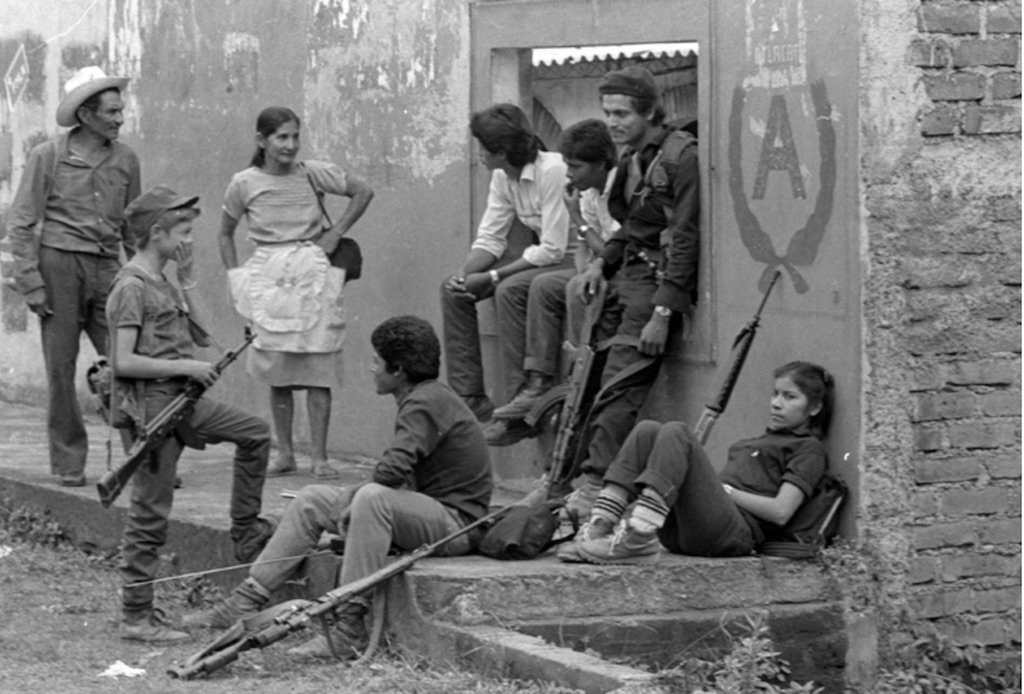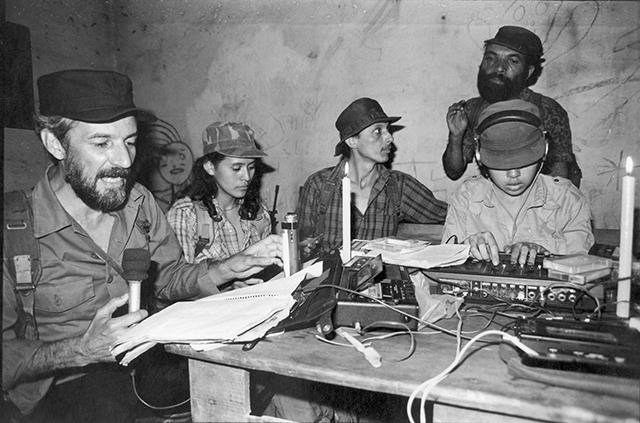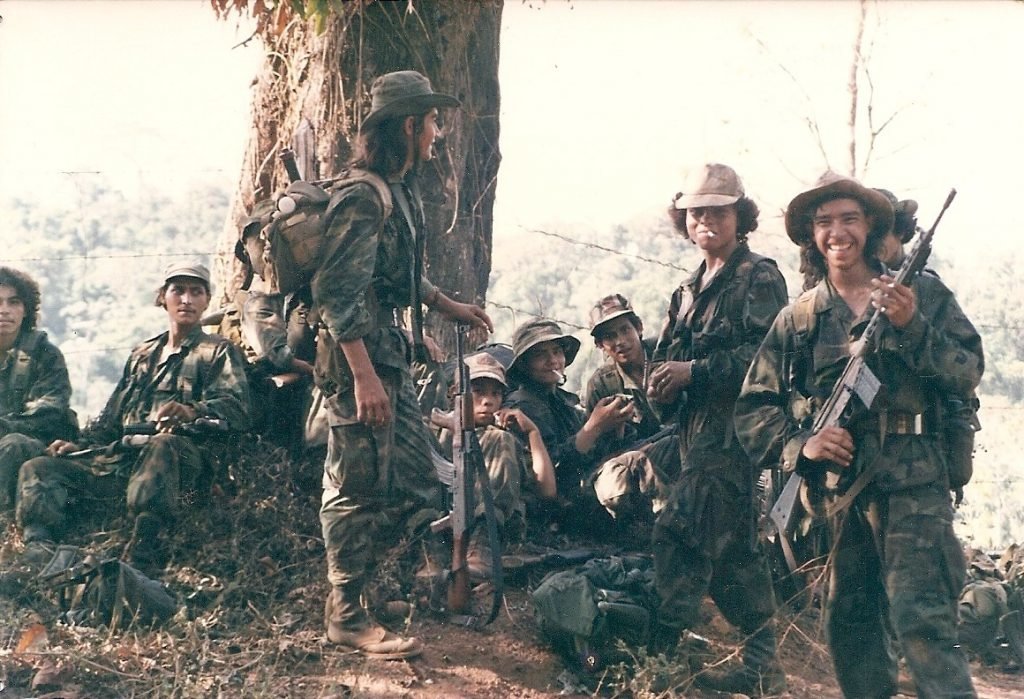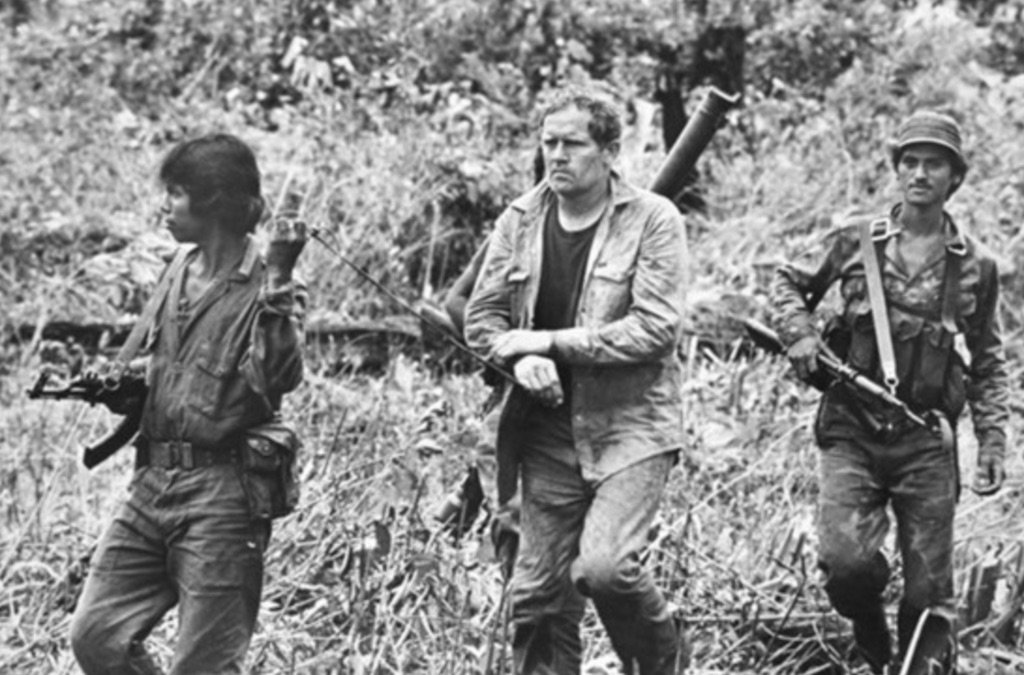
ERP combatants in Perquín, El Salvador in 1990. Photo courtesy of Wikimedia Commons (https://te.m.wikipedia.org/wiki/దస్త్రం:ERP_combatants_Perqu%C3%ADn_1990_24.jpg).
The relationship between the CIA and El Salvador is complicated. The Central American country was controlled by military dictatorships from the 1930s through the Salvadoran Civil War that broke out in 1979. In the time between those years, the nation had experienced minor conflicts, civil unrest, human rights violations, and increased guerrilla activity that ultimately led to the turmoil and full-blown civil war that ran through the early 1990s.
The Soviet Union and Fidel Castro’s Cuba backed the left-wing Farabundo Marti National Liberation Front (FMLN) and ran a covert program that supplied some 15,000 guerrilla rebels with 800 tons of modern arms and training — including the supply of western manufacturers to cover up the source of the weaponry.
The guerrillas in 1980 had a variation of pistols, hunting rifles, and shotguns until the communist military intervention of January 1981 supplied them with a weapons arsenal of their own. These guerrillas went from an uncoordinated militia to a heavily armed insurgency force overnight with a plethora of M60 machine guns, M79 grenade launchers, RPG-7 rocket launchers, M72 light antitank weapons, and various rifles originally manufactured from Belgium, Germany, Israel, China, and the United States.

When U.S. President Ronald Reagan assumed office the same month of the guerrilla general offensive and communist military intervention, El Salvador became the target of the largest counterinsurgency campaign since the Vietnam War. The U.S. had significant influence in Latin America, including training some of the most notorious dictators at the infamous School of the Americas, also known as the “School of Coups.” For six decades, some 65,000 soldiers, dictators, assassins, and mass murderers counted themselves alumni of the school that was first created in Panama in 1946 to prevent the spread of communism in the Western hemisphere.
Among the more prominent alumni from El Salvador was Roberto D’Aubuisson, a death squad leader who murdered thousands and gained the sadistic nickname of “Blowtorch Bob” for his methods of torture. Colonel Domingo Monterrosa, the first commander of the ATLACATL — an elite paramilitary unit trained and equipped by advisors from the United States — also attended the school and was later fingered for directing the El Mozote Massacre, the bloodiest slaying of guerrilla sympathizers in the entire civil war.
The U.S. advisors had their hands tied; they trained and equipped El Salvadoran military forces who, in turn, fought guerrilla factions; however, they also operated on their own at times and controlled the civilian populace through brutal violence no matter the cost or human atrocities they committed. During the civil war that lasted nearly two decades, an estimated 75,000 civilians were killed by government forces.

The Reagan administration had secured a $4 billion financial and military aid package for El Salvador on the condition that they had to inform Congress every six months on the progress of improvement of human rights conditions.
“The Salvadoran military knew that we knew, and they knew when we covered up the truth, it was a clear signal that, at a minimum, we tolerated this,” said American Ambassador Robert E. White at a hearing in 1993. Representative Robert G. Torricelli of New Jersey, Democratic chairman of the House subcommittee on Western Hemisphere affairs, later commented, “It is now clear that while the Reagan Administration was certifying human rights progress in El Salvador they knew the terrible truth that the Salvadoran military was engaged in a widespread campaign of terror and torture.”
The Reagan administration continued supporting the fight against the spread of communism in the region well into the early 1980s, while the CIA shifted its focus to Nicaragua as it was declared the source for weapons traveling across the border and a safe haven for guerrilla fighters. “President Reagan has authorized covert operations against the Central American nation of Nicaragua, which, administration officials have charged, is serving as the military command center and supply line to guerrillas in El Salvador,” wrote the Washington Post in 1982.
The U.S. Army Special Forces had a regular contingent of 55 soldiers in El Salvador during the height of the civil war, but the CIA had more leeway as their officers and contractors assumed unofficial covers attached to the U.S. Embassy. The CIA operated the Ilopango air base, and it was critically important for the use of airpower against El Salvadoran rebels as well as flying supply missions into Nicaragua beginning in 1983. Their air capability increased from 10 helicopters to more than 60 helicopters, some C-47 cargo planes to at least five AC-47 gunships, and a fleet of 10 fighter jets and 12 helicopter gunships for air support missions.
Félix Rodríguez, a Cuban native, was known in El Salvador under the alias of Max Gomez. Rodríguez was a legendary paramilitary operations officer in the CIA who was involved in the failed Bay of Pigs Invasion as a member of Brigade 2506. He also helped capture Che Guevara in Bolivia and later served in Vietnam with the Provincial Reconnaissance Units (PRUs). Rodríguez went to El Salvador as a private citizen in 1985, motivated to continue fighting against communism. He taught Salvadorans “tree-top” flying techniques from Huey helicopters like he did in Vietnam.
“By experience in Vietnam, we found out that going extremely close to the ground the guerrilla is not able to determine from what direction you are coming,” Rodríguez told “60 Minutes.” “From the time they see you, they don’t have many time to shoot you.”

U.S. Marine Lieutenant Colonel Oliver North eventually recruited Rodríguez to participate in the illegal Iran-contra resupply operation into Nicaragua. Congress had signed the Boland Amendment into law, which banned “humanitarian aid” to the Contras (anti-Sandinista guerrillas) in 1984; however, the Reagan administration established a “private aid” network using old deteriorating airplanes behind Congress’ back. The planes were equipped with “fuzzbusters” purchased from Radio Shack — a far cry from the state-of-the-art radar typically found inside CIA aircraft. The operation was doomed from the start and faced Soviet-made antiaircraft that Nicaraguan rebels employed against them.
On Oct. 5, 1986, Eugene Hasenfus, who worked for Corporate Air Services, a front for the Southern Air Transport, an air component of the CIA, parachuted safely from his C123K cargo plane that had been shot down by a surface-to-air missile. The incident exploded throughout the press and exposed the Iran-Contra Affair, which became one of the largest scandals of Reagan’s presidency.
The Iran-Contra Affair involved the illegal sale of weapons to Iran through Israel to secure hostages held by Hezbollah militants in Lebanon. The money made from the sale of weapons supplied the funds for the illegal Contras operation in Nicaragua. Hasenfus was the sole survivor and was captured 24 hours after evading Sandinista patrols. He was sentenced to 30 years in prison but was later returned to the U.S. via a spy swap. Several officials of the Reagan administration were convicted and indicted for their knowledge and actions in the aftermath of the scandal. However, in 1992, President George H.W. Bush pardoned them from further punishment. Peace talks ended the Salvadoran Civil War in January 1992, and the CIA’s shadow wars were revealed to the world a short time later.

Matt Fratus is a history staff writer for Coffee or Die. He prides himself on uncovering the most fascinating tales of history by sharing them through any means of engaging storytelling. He writes for his micro-blog @LateNightHistory on Instagram, where he shares the story behind the image. He is also the host of the Late Night History podcast. When not writing about history, Matt enjoys volunteering for One More Wave and rooting for Boston sports teams.
BRCC and Bad Moon Print Press team up for an exclusive, limited-edition T-shirt design!
BRCC partners with Team Room Design for an exclusive T-shirt release!
Thirty Seconds Out has partnered with BRCC for an exclusive shirt design invoking the God of Winter.
Lucas O'Hara of Grizzly Forge has teamed up with BRCC for a badass, exclusive Shirt Club T-shirt design featuring his most popular knife and tiomahawk.
Coffee or Die sits down with one of the graphic designers behind Black Rifle Coffee's signature look and vibe.
Biden will award the Medal of Honor to a Vietnam War Army helicopter pilot who risked his life to save a reconnaissance team from almost certain death.
Ever wonder how much Jack Mandaville would f*ck sh*t up if he went back in time? The American Revolution didn't even see him coming.
A nearly 200-year-old West Point time capsule that at first appeared to yield little more than dust contains hidden treasure, the US Military Academy said.












